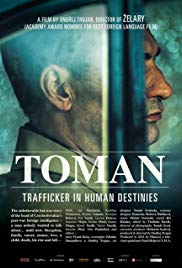
TOMAN
Czech Republic/Slovakia, 2018, 144 minutes, Colour.
Jiri Machacek, Katarina Wintereova, Stanislav Majer.
Directed by Ondrej and Trojan.
This is a film for a specialised audience. It was released in 2018, a collaboration between the Czech Republic and Slovakia, the former Czechoslovakia where the action of this film is set, from 1945 to 1948. It is full of particular detail, names and dates, perhaps even difficult for a Czech/Slovakian audience but demanding for an outside audience.
Nevertheless, this is a significant film for those two countries, a look back at the experience of Nazi occupation, the defeat of the Nazis, the entry of the Soviet troops, the establishing of Czechoslovakia as part of the Soviet Union, the impact of the communists, even those in the government in exile in Britain during the war, but also, the issue of the Jews, and the release of Polish Jews, especially from the concentration camps, their getting a pass through Czechoslovakia in order to go to Germany and to safety in the West, eventually many to Israel.
The central character is the politician, Toman, his significance in Czech politics during the war, his return home and his becoming part of the government, his communist commitment, his Jewish background and the appeal is made to him for safe passage of the Jews. He has sometimes been called the “Czech Schindler� (and at moments during the film the actor, Jiri Machacek, though not as tall, has some facial resemblance to Liam Neeson).
The film opens with a question, the arrest of Toman and his being interrogated for corruption in 1948. The structure of the film is to go back to 1945, the end of the war, his return to his home country, his political involvement (though there are many questions about his being both Communist and Jewish), his becoming part of the government.
It soon emerges that he is a very dubious character. The committed Communist but, with his financial wheeler dealings, sending jewellery to England to raise funds for his particular causes, married and his wife becoming pregnant but his having affairs with his assistants in the office, becoming more and more involved in the machinations of government, the government ministers being seen as more and more corrupt as the years go on (and several executed after a show trial in 1952), he is not an admirable hero.
However, with some doubtful motivations, he does make connections with the Americans, Ambassador, officials, relief workers for Jews in process, and utilises his British connections to make money, often sending his wife to negotiate the deals.
This is quite an expose also of corrupt government, of politicians always trying to get something on the other in order to use it, blackmail, get rid of rivals.
Perhaps one of the morals of the story is that out of bad there can be good and salutary effects. b